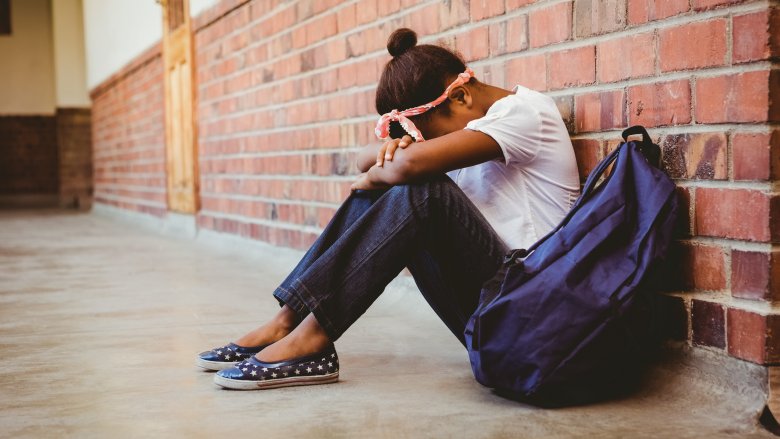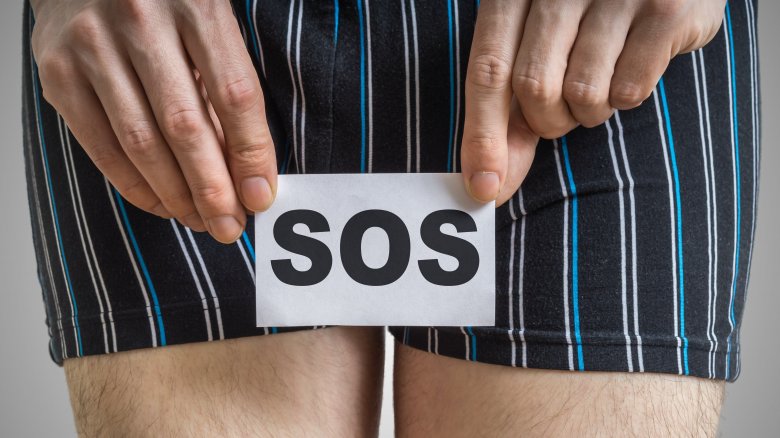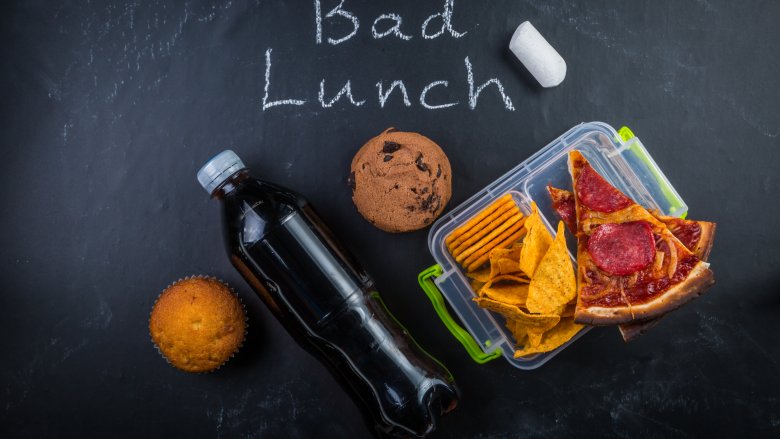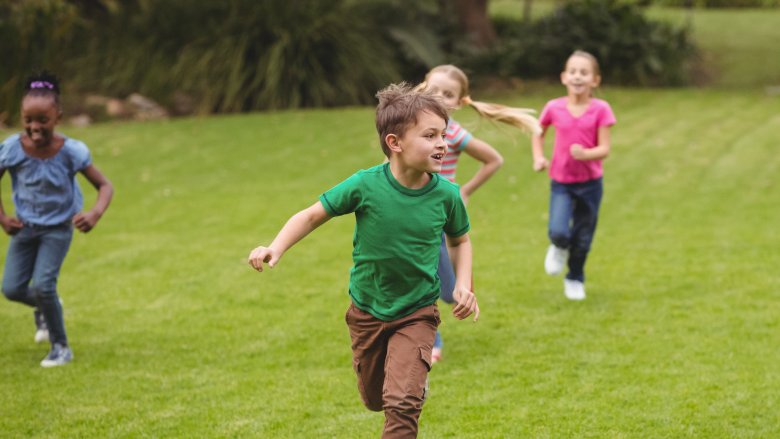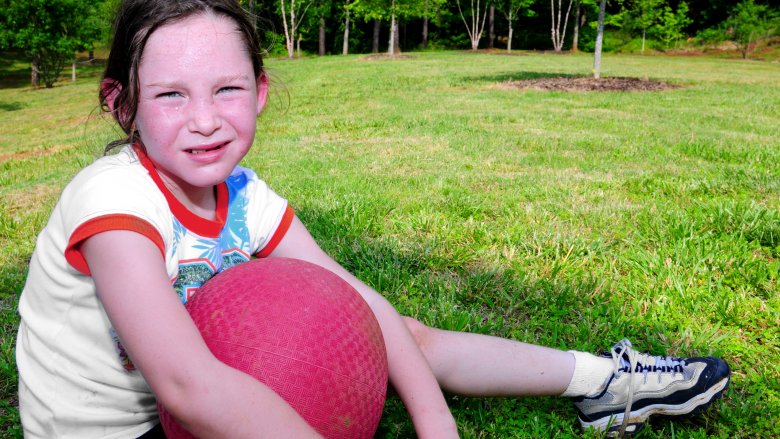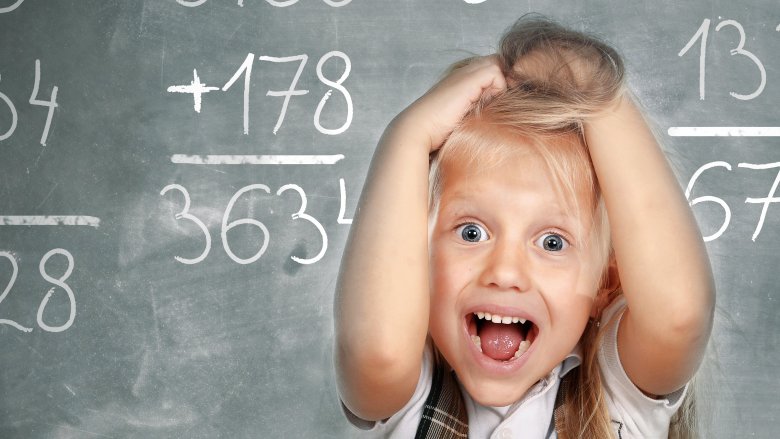Messed Up Things About Elementary School You Only Notice As An Adult
Ah, elementary school. Whether you loved it or hated it, you probably survived it. Your earliest memories are probably on a sunny playground, and your earliest nightmares might have involved kickball competitions in Hell, played by demons with fiery arithmetic symbols carved into their foreheads. However, when you look back on those elementary school days, some of the things you took for granted seem strange, and sometimes even disturbing.
Competition is actually really bad for learning
You might walk into first grade as a bright-eyed youngster, but on Day One, you're ruthlessly compared to the other kids. What, you thought your A+ dinosaur drawing was cool? Well, Timmy over there is already doing multiplication tables, so now you're a loser from Loserville. Meanwhile, Caitlin is looking at your A+ drawing wondering why her stegosaurus only got a B. Elementary school competition isn't fun and games: It's brutal warfare, with good grades as the prize. The problem is that competition actually hinders learning. Oops. According to Stanford, the competitive system "enjoyed" (cough) by U.S. students leads to stress, anxiety, and cheating because many students are so focused on grades that they don't have the mental energy for, you know, learning.
Superior education focuses on cooperation, not competition. For example, The Atlantic advises taking a look at Finland's highly acclaimed education system, since Finnish students earn some of the highest test scores in the world. "Bah, they're just better at teaching to the test," a thousand jaded educators just muttered. Actually, Finland doesn't care about testing, ranking, comparing academic achievements, or any of that. Finnish education instead prioritizes creativity, equality, and individual triumphs. There are no private schools and no tuition fees, so every citizen in the country — poor or wealthy — receives equal education opportunities. Finland's approach is best summed up by Finnish author Samuli Paronen, who wrote, "Real winners do not compete."
Having to ask for a bathroom pass
Let's shatter those rose-colored glasses. Next time someone smugly lectures you about the "good old days" of elementary school, remind them of the "joys" of raising your hand and asking for a bathroom pass anytime you needed to pee. Wow, adulthood suddenly doesn't seem so bad anymore, eh?
Writing for Parents.com, pediatric urologist Steve Hodges, M.D., explains why restricting children's bathroom rights is a horrendous concept. While Hodges empathizes with the inherent challenges in managing a classroom stuffed with 30 full bladders, he points out that making a kid "hold it in" can severely damage still-growing internal organs, leading to bed-wetting accidents, constipation, and worse. Disturbingly enough, some schools even reward kids with coupons for not going to the toilet, which is one of the creepiest policies imaginable.
Sadly, the bathroom problems don't end there. Back when you were a kid, do you remember your teacher ever going to the loo? Probably not, because according to The Atlantic, teachers are often restricted to only one bathroom break every three hours(!), which basically forces them to choose between two lovely options: dehydration or spending half the day practicing pain management techniques. Not fun. The overarching lesson of this bathroom madness is that if schools would just let everyone do their business whenever they felt like it, the world would be a better place.
Homework hurts families and doesn't help students much
Kids know homework sucks, and they show it with a nightly chorus of complaints. What kids don't realize, though, is that the real reason homework sucks is because it cuts into family time, dinnertime, playtime, and extracurricular activity time, plus it makes parents into bad guys. As Time explains, younger children aren't psychologically ready for the lessons in "time management" that homework is supposed to teach, which means the responsibility of getting homework in on time falls on the parents. So when Mom gets home from a long day at work, there might not be time for Netflix, chilling, or even a nice family dinner. Instead, she spends the whole evening pestering her kid to do homework, transforming her from beloved parent into a terrifying homework patrol cop. It's like kicking back with a beer, then finding out the beer is full of stress, anxiety, and an angry kid.
Most tragically, the much-touted "benefits" of homework don't live up to the hype. A meta-analysis of 180 studies by psychologist Harris Cooper showed that while nightly homework does help teenagers, there's no perceivable benefit for elementary school kids at all. Despite this, research cited by CNN shows that elementary schoolers keep getting piled up with more and more homework.
Dictatorships are never a good thing
Remember that one shy kid? You know, the one who kept their head low, stayed quiet, and sat in the back? Even though this kid was giving every indication they didn't want to talk in class, the teacher would make an example of them and demand they speak up. In school, this was called "cold-calling." You know what we call it in the adult world? Bullying.
Think that's an over-reaction? Let's think about it. As explained by Alfie Kohn on Psychology Today, cold-calling is a form of humiliation that forces a student to participate in class. It also intimidates (read: bullies) other students into participation out of fear they might be cold-called next. That's totally different from gently asking a quiet student if they have anything to say. Kohn argues that aggressive cold-calling is just one symptom of a disease: The classic classroom structure is authoritarian, with the teacher positioned as a dictator who gets to decide when (or if) anyone else speaks. Even standard hand-raising protocol is problematic, because it enforces the undemocratic idea that you're only allowed to speak if the boss lets you.
But without hand-raising, how could a classroom not be a madhouse? Well, check out the above video of a classroom in Kentucky, which shows a teacher guiding her classroom into a discussion where students listen to each other, and take turns to talk ... you know, just like adults.
School lunches are notoriously unhealthy
Sucking down chocolate milk, soda, cookies, and pizza for lunch every day sounds nice, until the health consequences ruin the whole thing. Nobody's gonna knock you for having junk food sometimes, but every day? Hmm...
The plastic lunch trays used by kids in the U.S. are stacked high with processed calories, sugars, fat, and excess sodium, according to LiveStrong. Whether these fatty, salty meals taste good or not, this sort of daily diet will eventually cause diabetes, obesity, heart disease, kidney stones, and cancer, and kids pick up lifelong eating habits at an early age. According to the New York Times, this situation was improved by the Healthy, Hunger-Free Kids Act of 2010, which updated federal guidelines with common-sense changes like separating fruits and vegetables into two food groups instead of one, as well as spurring schools to do better on a local level as well. As of 2017, the future of the rules is unclear.
But seriously, why are lunch meals so crappy? Like many problems, it boils down to money. According to the Art Institutes, schools that serve their meals through the National School Lunch Program get only a few dollars for each free meal served. Those couple of bucks have to cover the food, the labor, the structural costs, and more, so it's a tight squeeze.
Parents end up paying a lot of money, even for 'public school'
What's worse than eating crappy food as a kid? Being a parent, and paying for your kid to eat crappy food. However, school lunches aren't the only cash wad that parents have to pony up for their kids, even if their children attend a "public" school. And no, we're not talking about taxes.
The vicious rise of "pay-to-play" systems, where extracurricular activities are bundled up with a hefty price tag, are increasingly punishing low-income families who just want their kids to succeed. NBC told the story of Maggie Little, a single mother in Texas, who in 2013 had to pay up to $200 a semester for her daughter's advanced placement classes, in addition to coughing up an additional $400 for marching band. Sure, these costs aren't "required" since participation in such activities isn't "mandatory." But if you want to enroll little Joe in the soccer team, sorry, most schools will make you pay up.
In addition, parents often have to pay rising "class fees" for each kid. Schools argue that all this dough is necessary due to escalating budget problems, but according to the University of Michigan, pay-to-play programs mean that lower-income families can't afford to enroll their kids in activities like band, baseball, quiz bowl, and so on. As a result, poor kids become deprived of the opportunities that more privileged kids take for granted.
The whole 'taking away recess' punishment only makes unruly kids more unruly
When a kid blows nasty spitballs across the classroom, they're often threatened with having their recess taken away. Now, when you're a kid, a canceled recess feels about as traumatic as credit debt feels to an adult. There's an obvious problem with this punishment: an unruly kid is like a coiled spring, loaded with energy, and if you don't give that energy an outlet — like recess — that spring will unload across the classroom and maybe break a window.
Kids might think that recess is a "break," but adults realize the playground is where all of life's biggest lessons occur: the first kisses, the social bonds, the overcoming of challenges, the networking skills. These observations are backed up by the American Academy of Pediatrics, which argues that playtime is absolutely essential for proper childhood development. That annoying kid with the spitballs needs more recess time, not less.
Once again, let's look to Finland. The New Republic tells us that Finland's kids enjoy a thrilling 75 minutes of recess a day, as opposed to the miserly 27 minutes average U.S. kids put up with. According to Today, a Texas school followed this approach, giving kids an hour of recess. The result? Students became less fidgety in class, more focused, and more creative. So c'mon, schools. Let 'em play more!
Forcing kids to play team sports makes them hate exercise
Considering we're a species that evolved to chase woolly mammoths through the tundra, we need all the running we can get. When negative P.E. experiences traumatize kids into hating exercise, that's a big problem.
Forcing kids to play competitive team sports in P.E. is the issue here, as described by Jessica Olien on Slate. How so? Well, remember those old kickball games in gym class? Okay, now remember how the popular/athletic kids were always picked first, while the unpopular or less athletically gifted kids were picked last? That's the crux of the issue. The last-picked kid already feels bad, and suddenly their entire team gets mad at them every time they miss the ball, leading to stress, anxiety, and increasingly poor performances. Sure, lots of kids like team sports: That's what extracurricular athletics programs are for. However, many children just don't like competitive sports, so forcing their involvement often teaches these kids to hate their body, to feel lesser, and to resent physical activity. According to a study referenced in the Telegraph, the psychological trauma of school P.E. can make people avoid exercise for the rest of their lives.
Physical education is extremely valuable, but the problem is forcing competition into the equation. P.E. shouldn't make kids feel bad, but should instead encourage them to push their limits, get stronger, and enjoy themselves.
Forcing kids to pledge allegiance is kinda weird
If you grew up in the United States, you probably know the Pledge of Allegiance by heart. For years, you stood there every morning, placed a hand over your heart, and recited a speech vowing allegiance to a flag. But you're an adult now. Doesn't forcing kids to recite a loyalty oath to "freedom" seem a little hypocritical? So much for "freedom of speech," right?
The United States flag is supposed to represent freedom, rights, and liberty, but there's nothing free or liberating about requiring kids to stand up and recite a loyalty oath. Psychology Today even argues that sitting out the pledge could be seen as a "noble act of patriotism," since true freedom means being able to make choices, including the choice to not participate in a speech. Though the U.S. Supreme Court has guaranteed the right to refuse participation in the pledge, many kids don't finish reading 1943 SCOTUS decisions in the earliest grades, and therefore probably don't realize it.
The pledge certainly has nothing to do with the founding fathers, considering weird stuff like loyalty oaths are exactly what they rebelled against. As the Smithsonian points out, the Pledge of Allegiance was invented in 1892 as a marketing gimmick to sell children's magazines and U.S. flags. Whatever way you slice it, requiring the pledge doesn't mesh with the values the United States is supposed to represent.
The hierarchy of math
Oh, now we've struck the mother lode, the subject that half of us had nightmares about. In school, it seemed like only the chosen prodigies — the so-called "math kids" — could understand those wacky arithmetic symbols. The rest of us were just too dumb. But that narrative is total malarkey. Everyone, both genius and non-genius alike, is capable of succeeding at elementary school math. The problem is that math is taught in a hierarchical fashion, where kids are seen as either destined to succeed or fail at it.
In the New York Times, David Bornstein argues that when math is first introduced into the classroom, some kids get it right away — and some don't. This snap judgment immediately places kids into two groups: the "math smart" group, and the "math dumb group." As the "math smart" group advances faster and faster, the "math dumb" group is never given the opportunity to catch up. This isn't because these kids can't do math, it's because they never had the little bit of extra attention they needed at the start. However, because these "dumb" kids feel helpless while the "smart" kids make leaps and bounds, they begin to believe that they just "aren't math people." The Times piece argues that one solution is a program like Jump Math, which breaks math problems down into micro-steps, allowing every kid to master these steps at their own pace.
D.A.R.E. doesn't work
When you're a kid, D.A.R.E. seems to make sense. The program teaches you how awful drugs are, why they'll kill you, and why you should always "just say no." Then you get older, and hormones start rushing in. The kids wearing D.A.R.E. T-shirts are the same ones who cloud up the bathroom with smoke. Suddenly, your biggest crush is asking if you want to try crystal meth, and "just say no" doesn't seem so easy anymore.
By adolescence, everyone figures out that D.A.R.E. isn't what it's cracked up to be. According to Scientific American, a 2009 mathematical review showed that kids who enrolled in D.A.R.E. programs were just as likely to use drugs as those who didn't. In other words, D.A.R.E. did ... um, nothing. In 1999, the American Psychological Association deemed D.A.R.E. to have "no effects." So what's the problem? Scientific American argues that the standard "just say no" program doesn't teach kids the social skills necessary for navigating peer pressure. Saying no to drugs is easy in a chant, but a bit harder in the real world, where one is at risk of bullying or is being offered drugs by a potential romantic interest or a close friend. It takes practice! Unfortunately, D.A.R.E. programs don't spend the time teaching kids how to handle these situations in an adult manner. According to Mic, D.A.R.E. also loses credibility with kids because it lies to them, promoting outdated theories and scare tactics that any teenager with a smartphone would scoff at.
